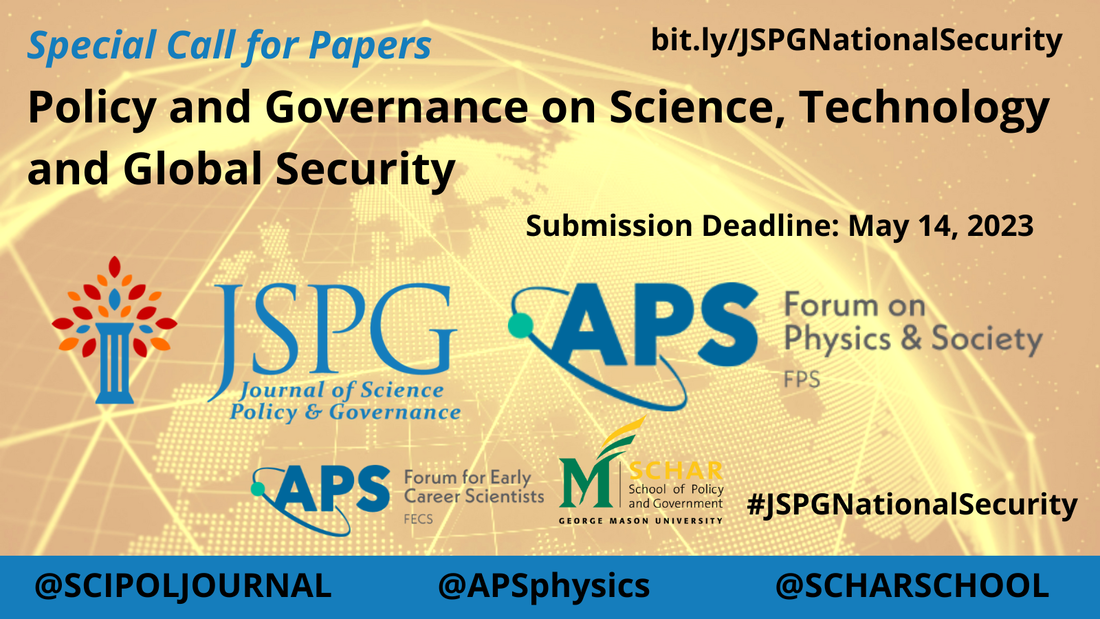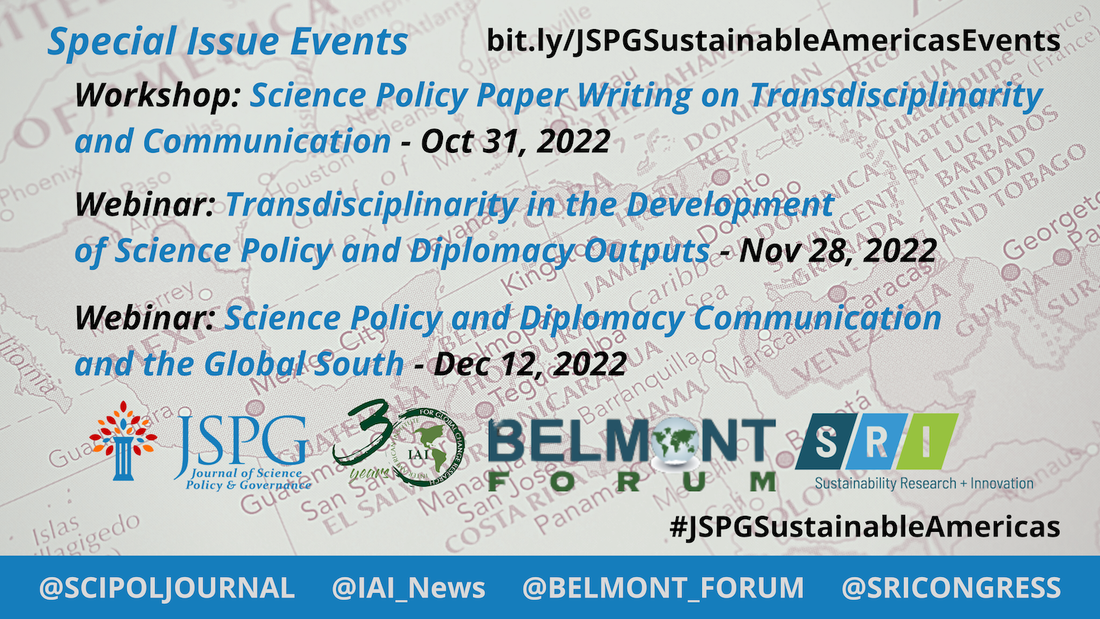Special Topics Call for Submissions
Development Policy and Global Change Science to Achieve the Vision of Sustainable Americas
In the face of urgent global change issues we need to invest more in collaboration and synergies. The next generation of science and policy leaders have new ideas and need an Inter-American platform to amplify their voices and cultivate skills to support effective regional solutions.
— Marcos Regis da Silva, Executive Director, Inter-American Institute for Global Change Research (IAI)
JSPG is thrilled to partner with the Inter-American Institute for Global Change Research (IAI) on this call for papers to showcase early career voices in addressing global science policy and diplomacy challenges, and to continue expanding the journal’s reach across the Americas.
— Adriana Bankston, CEO & Managing Publisher, Journal of Science Policy & Governance
SPECIAL CALL FOR SUBMISSIONS:
The Journal of Science Policy & Governance (JSPG) and the Inter-American Institute for Global Change Research (IAI) are pleased to announce a call for papers and competition to provide nations of the Americas with tools and institutional capacities to better face Global Environmental Change (GEC) challenges. This special issue is focused on international collaboration and the exchange of scientific information and knowledge relevant to Development Policy and Global Change Science to Achieve the Vision of Sustainable Americas.
Challenges posed by GEC are complex and require a transdisciplinary approach which involves the co-design and co-production of research with a diverse coalition of stakeholders including scientists, government decision-makers and civil society actors working together towards a solution. Full and open exchange of scientific information related to GEC is also important. This includes working at the science policy and diplomacy interface, as many of these challenges are transboundary, regional or global, and require partnerships within and between countries, involving a number of sectors, including government, academia, and other organizations.
We invite young professionals, early career researchers, students, post-doctoral researchers and policy fellows from around the world to submit policy briefs, policy analyses and position papers, technology assessments and other articles addressing bold and innovative policy and diplomacy ideas for tackling complex societal problems around GEC that have become increasingly transboundary in nature. Submission deadline extended: February 19, 2023.
This Special Issue is supported in-kind by outreach partners from the Belmont Forum and SRI Congress.
Follow JSPG on Twitter, Facebook, LinkedIn, Instagram, and YouTube. Join our monthly newsletter. Tweet using #JSPGSustainableAmericas.
Challenges posed by GEC are complex and require a transdisciplinary approach which involves the co-design and co-production of research with a diverse coalition of stakeholders including scientists, government decision-makers and civil society actors working together towards a solution. Full and open exchange of scientific information related to GEC is also important. This includes working at the science policy and diplomacy interface, as many of these challenges are transboundary, regional or global, and require partnerships within and between countries, involving a number of sectors, including government, academia, and other organizations.
We invite young professionals, early career researchers, students, post-doctoral researchers and policy fellows from around the world to submit policy briefs, policy analyses and position papers, technology assessments and other articles addressing bold and innovative policy and diplomacy ideas for tackling complex societal problems around GEC that have become increasingly transboundary in nature. Submission deadline extended: February 19, 2023.
This Special Issue is supported in-kind by outreach partners from the Belmont Forum and SRI Congress.
Follow JSPG on Twitter, Facebook, LinkedIn, Instagram, and YouTube. Join our monthly newsletter. Tweet using #JSPGSustainableAmericas.
Submission Guidelines & Competition:
Submissions to the Special Issue will be accepted until EOD on February 19, 2023. Submissions will be reviewed by the JSPG editorial board. Accepted articles will undergo peer review by the JSPG editorial board. Following peer review, accepted articles will be entered into a policy paper competition, where a committee of experts in the science policy-diplomacy interface of global environmental change will select the top three articles. First, second and third place article winners will have the opportunity to present published work at the Sustainability Research and Innovation Congress in Republic of Panama in June 2023. The criteria by which competition winners will be chosen can be found in this rubric.
Guiding Events:
Leading up to the submission deadline, JSPG and IAI will organize a series of training sessions to provide prospective authors with opportunities to practice policy writing, and to inspire and empower them with expert perspectives on science-policy communication to inform their submissions to the Special Issue.
Please register for the events below. More information on these events will be shared as it becomes available. Questions regarding these events may be directed to JSPG's Director of Programs and Events Julianne McCall.
Please register for the events below. More information on these events will be shared as it becomes available. Questions regarding these events may be directed to JSPG's Director of Programs and Events Julianne McCall.
Policy writing workshop: October 31, 2022, 1:00-2:30pm ET: Writing Workshop on Transdisciplinarity and Communication.
Webinar 1: November 28, 2022, 1:00-2:00pm ET: Transdisciplinarity in the Development of Science Policy and Diplomacy Outputs.
Webinar 2: December 12, 2022, 2:00-3:00pm ET: Science Policy and Diplomacy Communication and the Global South.
Webinar 1: November 28, 2022, 1:00-2:00pm ET: Transdisciplinarity in the Development of Science Policy and Diplomacy Outputs.
Webinar 2: December 12, 2022, 2:00-3:00pm ET: Science Policy and Diplomacy Communication and the Global South.
Guiding Themes & Questions:
Global change in science can be achieved by supporting flexible science-based policies and actions, including large efforts of mitigation and adaptation by societies and ecosystems. Below are a few guiding questions to help spur creative thinking among prospective authors, and these questions can help provoke ideas:
- Transdisciplinarity: How do we conduct or promote participatory and interdisciplinary research that includes end-users and those actors affected by global change impacts from project design through implementation, monitoring and evaluation? How do we ensure that the work being done is respectfully and ethically conceived, developed and delivered with societal stakeholders who will be most impacted? How do we support community led adaptation?
- Science diplomacy: What are the fluid and evolving examples of science diplomacy across sectors (national governments, city/state, supranational, universities, private sector)? How can science diplomacy adapt to be context dependent (by region, country, or issue)? How is the Global South implementing science diplomacy and taking into consideration the decolonization of science, integrating different ways of knowing through local & indigenous engagement?
- Science-based policy for all: How do we design inclusive science that improves the ability of the Americas to cope with and thrive under GEC, making a positive impact towards the sustainability of the region? Areas to cover include: reduction of poverty and inequality; improving food, water, and energy security; climate change adaptation and mitigation; improved human health and well-being; conservation and restoration of biodiversity and ecosystems; clean air, water and soil.
- Integration across scales: Science on human dimensions should cut across all themes, as well as support adaptation and mitigation to GEC. How do we encourage integration across scales (locally, nationally, regionally) so that research supports all levels of the decision-making process and informs other scales, including in data sharing and stakeholder engagement?
- Culture and outreach: How do we support and promote an inclusive evidence informed culture for more effective outreach and knowledge mobilization to bridge communication and engagement between scientists, policy makers and society to address GEC?
- Building institutional capacity and supporting transformation: How do we build training and capacities that enhance the knowledge and skills of institutions and individuals and strengthen the science-policy interface for global change, including climate change, biodiversity and ecosystem services for long-term human well-being and sustainable development? How do we support the necessary structural and institutional dialogues, changes and/or reforms that will be needed to achieve effective stewardship in an era of sustainability?
- Governance and local implementation: How do we achieve or overcome the fragmentation and crowding of globally-agreed environmental goals and targets to achieve action and results? How do we build regional environmental governance frameworks, reconcile diverse perspectives and ensure local policy implementation?
Recommended Readings and Resources:
- New Frontiers in Science Diplomacy, Royal Society & AAAS, 2010
- Science Diplomacy in Latin America and the Caribbean: Current Landscape, Challenges, and Future Perspectives, Frontiers, 2021 [Spanish: Science Diplomacy in Latin America and the Caribbean (Informe UNESCO-CILAC)]



